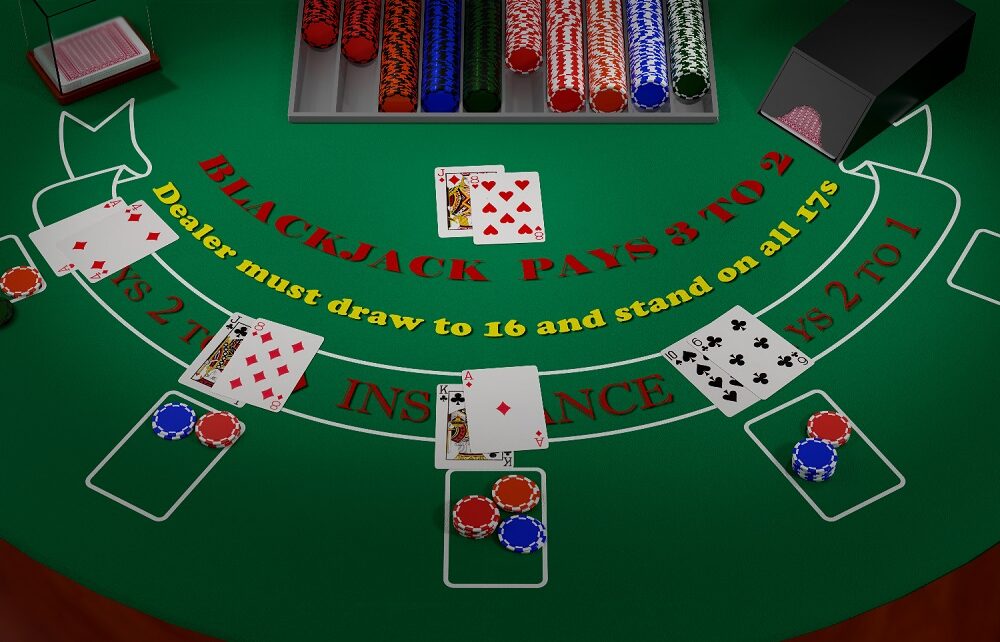In the realm of blackjack, the choice between single-deck and multi-deck games can have a significant impact on your gameplay. The key differences between these variants go beyond just the number of cards in play. Understanding these differences is crucial as they can affect your strategic decisions and overall experience at the tables.
Single-deck blackjack games use only one deck of cards, which can give players a slight advantage due to the increased likelihood of certain cards being dealt. This can influence decisions like when to hit, stand, or double down. However, single-deck games often come with stricter rules, such as limitations on splitting or doubling down, which can offset the advantage of fewer decks.
On the other hand, multi-deck blackjack games typically use six to eight decks, which can make card counting more challenging. While the increased number of decks reduces the impact of individual cards, it also provides a more consistent experience over time. Multi-deck games may offer more liberal rules for players, such as more opportunities to split or double down, which can be advantageous if used strategically.
Ultimately, the choice between single-deck and multi-deck blackjack games depends on your playing style and preferences. Both variants have their pros and cons, and understanding how these differences influence gameplay can help you make informed decisions at the casino tables.
Advantages of Single-Deck Blackjack
Playing single-deck blackjack offers advantages in card counting due to the limited number of cards in play. This makes it easier to track the cards that have been dealt, allowing players to make more informed decisions. The simplicity of a single deck simplifies the counting process, potentially improving strategic play and bet adjustments.
Single-deck games generally offer better odds for players compared to multi-deck games, leading to the possibility of higher payouts. Developing proficiency in card counting in single-deck blackjack can provide a strategic edge and enhance the overall gaming experience.
Benefits of Multi-Deck Blackjack
To comprehend the advantages of multi-deck blackjack, it’s essential to consider how the increased number of decks affects the game dynamics.
-
Reduced Card Counting Advantage: The presence of multiple decks in play diminishes the effectiveness of card counting strategies, making it more challenging for players to gain an advantage over the casino.
-
Less Frequent Shuffling: In multi-deck blackjack games, shuffling occurs less frequently compared to single-deck games. This characteristic allows players to experience more continuous gameplay without frequent interruptions for shuffling.
-
Smoother Variance: The utilization of multiple decks in blackjack helps to stabilize the variance in the game. This results in a more consistent gaming experience by reducing the occurrence of extreme swings in luck.
These factors contribute to making multi-deck blackjack an attractive option for players seeking a different level of challenge and a more balanced gameplay environment.
Strategy Variances Between Decks
Understanding the differences in strategy between single-deck and multi-deck blackjack games is essential for players looking to optimize their gameplay.
In single-deck games, the smaller number of cards makes card counting a more effective strategy. Players can more accurately track the distribution of high and low cards, which can inform their decisions on whether to hit, stand, or double down.
On the other hand, multi-deck games present a greater challenge for card counting due to the increased number of cards in play. In these games, players often rely on basic strategy charts to determine the best course of action for each hand.
Adapting one’s approach based on the number of decks in play is crucial for improving one’s odds of success in blackjack.
Impact of House Edge
The house edge plays a significant role in determining your chances of winning in blackjack and should be carefully considered. Understanding how the house edge affects your gameplay is essential for making informed decisions at the blackjack table. Here are key points to consider:
-
Single-Deck Blackjack: Generally offers a lower house edge compared to multi-deck versions, which can improve your winning potential.
-
Multi-Deck Blackjack: Tends to have a slightly higher house edge due to the increased number of cards in play, impacting your odds of winning.
-
House Edge Variations: Vary across different casinos and types of blackjack games, necessitating awareness of the specific house edge of the game being played.
Choosing the Right Variant
When selecting a blackjack variant, it’s important to consider the impact of the house edge on your gameplay. The choice between single-deck and multi-deck blackjack should be based on your risk tolerance and playing style. Single-deck games offer a lower house edge but can be more volatile due to the greater influence of each card dealt.
In contrast, multi-deck games provide more stability but typically come with a slightly higher house edge. If you prefer a simpler strategy with potentially higher payouts, single-deck blackjack may be the more suitable option.
However, if you prioritize consistency and are willing to accept a slightly higher house edge for a smoother gaming experience, multi-deck blackjack could be the better choice for you.
Conclusion
Having a good understanding of the differences between single-deck and multi-deck blackjack enables players to make informed decisions based on their preferences and strategic approach. Single-deck blackjack offers simplicity and potentially favorable odds due to the lower number of cards in play, making it easier to track cards and make strategic decisions. On the other hand, multi-deck blackjack introduces more complexity and challenges, requiring players to adjust their strategies to account for the increased number of cards and potential variations in gameplay.
Choosing between single-deck and multi-deck blackjack depends on individual playing styles and goals. Players looking for straightforward gameplay and a focus on basic strategy might prefer single-deck games, while those seeking a more intricate and strategic experience might opt for multi-deck variations. By understanding the advantages and strategy differences between the two variants, players can tailor their approach to optimize their chances of success at the blackjack table.




